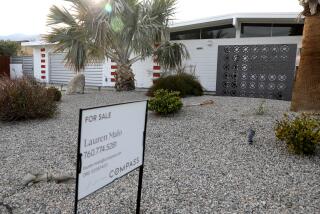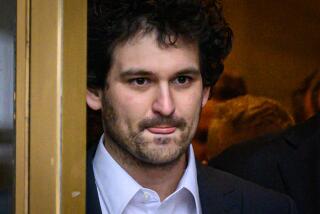Helllloooooo?
- Share via
Those stockbrokers making cold calls from the boiler room soon become accustomed to prospects’ slamming the phone down.
But there are times the fast-talkers would do well to hang up in a hurry themselves. Such as when the person on the other end answers, “Utah Securities Commission.”
In the Utah case, which occurred last summer, the broker wasn’t daunted at all, boldly making a pitch that misrepresented his years in the business (one, not eight), his position (employee, not 30% owner) and his education (high school diploma, not college degree). His spiel was recorded--and his license ultimately revoked.
Cold-callers making dubious pitches tend to have more brass than brains, as proved by the many calls they make to regulators, lawyers and others in a position to see that those who break securities rules get punished.
“Sometimes when I get a cold call, I say, ‘What’s your CRD number?’ ” said Mark Griffin, director of the Utah securities commission, referring to what’s called the Central Registration Depository identification number for a brokers’ regulatory records. When Griffin goes on to explain that he’s a regulator, “the line goes dead.”
William McLucas, director of enforcement at the Securities and Exchange Commission, recalls being promised by a cold-caller who reached him at the SEC three years ago that a particular stock “would go completely over the roof.”
That’s the sort of guarantee brokers are never supposed to make. But this particular broker continued undaunted, although McLucas had answered the phone “Enforcement Division” and then made a point of asking the caller if he knew to whom he was speaking. “Sure, you’re Bill McLucas,” the cold-caller replied.
“I said, ‘I’m the director of enforcement of the SEC,’ ” McLucas recalled. “And he said, ‘So?’ And I said, “You’d better hope everything you just said is really accurate, because I was taking notes.” McLucas had investigators at the caller’s firm within two hours. There ultimately was not enough evidence to bring a case, McLucas said, but it did “scare the living hell” out of the firm.
If some regulators and lawyers will be upfront immediately, others will lead cold-callers down the garden path.
One unlucky operator called someone who turned out to be investigating the broker’s firm. Dennis Klejna, former enforcement chief at the Commodities Futures Trading Commission, recalled that staffers gathering around to hear the broker’s pitch over a speakerphone, then hearing the caller ask if they’d be interested in his investment idea.
“We said, ‘Well, we can’t really do that,’ ” Klejna said. “And he said, ‘Why not?’ And we said, ‘Well, because we’re attorneys in the division of enforcement of the Commodities Futures Trading Commission, and we’re prohibited by law from engaging in these transactions.’ ”
“Oh, well, we can get around that,” said the broker, suggesting that they skirt the rules. The caller’s firm wound up the target of an CFTC fraud suit.
Andrew Blum, former managing director for member firms at the National Assn. of Securities Dealers, said a cold-caller who pursued him during his NASD days was equally oblivious.
“He said the stock he was recommending would make 2 points in 10 days, and I said: ‘Do you know where I work? The NASD.’
“That’s terrific. Let’s buy 12,000 shares,” said the intrepid broker. Nor was the broker taken aback when Blum said he’d just had lunch with the chairman of his brokerage. Apparently he didn’t even know the name of his firm’s top executive.
“I kept giving him the needle, and it didn’t seem to bother him at all,” Blum said. “It was utterly unbelievable.”
Neal Sullivan, executive director of the North American Securities Administrators Assn., recently took a call from a broker who promised a 30% return on an investment in two weeks. Sullivan said the caller pushed hard to get Sullivan’s Social Security number. Brokers need a client’s Social Security number to open an account. If someone is especially insistent that you give it to him, however, be wary. The dishonest will use that information to make an unauthorized trade, Sullivan explained. Sullivan forwarded a complaint to the Maryland attorney general’s office.
Sometimes, though, a caller will comprehend an especially blunt statement.
Brian Smiley, an Atlanta lawyer who represents investors in cases against brokers, told one cold-caller that he was in the business of suing stockbrokers. The broker got the idea and hung up.
Requests for information tend to be effective too.
A broker pitching to James Bodovitz, a former SEC lawyer, was asked to provide references from three happy customers. The next sound was a dial tone.
Richard Marshall, another former SEC lawyer, said his favorite technique to end cold calls is to ask for information in writing. “I say, ‘Send me information in the mail,’ ” he said. “These little penny-stock firms will never do that, so it just goes away.”
But there will always be the callers who just don’t get it.
Smiley recalled an incident in which he had just returned to his office right after giving testimony to Congress about the misdeeds of a certain penny-stock firm, only to get a cold call from one of its brokers.
“I thought someone in the office was pulling my leg because the firm’s management had just stood up and walked out during my testimony,” he said.
It was, however, an authentic cold call, which Smiley tried to end by saying he’d just sued the broker’s firm. And still the caller would have none of it.
“He said, ‘Well sir, you always have some bad apples, but that shouldn’t discourage you from doing business with me,’ ” Smiley recalled.
*
Susan Antilla writes for Bloomberg News. She can be reached at santilla@bny15.bloomberg.com
More to Read
Sign up for Essential California
The most important California stories and recommendations in your inbox every morning.
You may occasionally receive promotional content from the Los Angeles Times.













